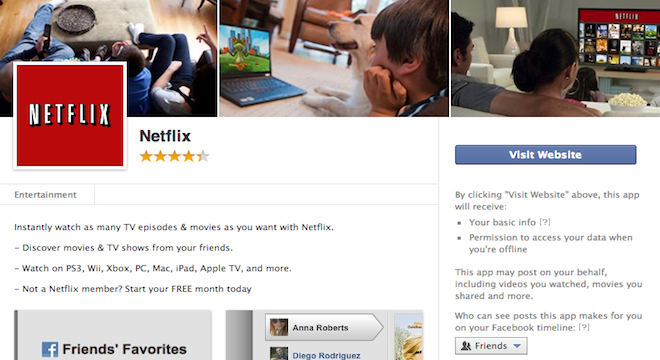The popular movie streaming service Netflix celebrated a vote by the House of Representatives on Tuesday that amended a law banning video rental companies from sharing a customer’s rental history. The new amendment would explicitly allow companies like Netflix to share customers’ viewing history, per a customer’s informed consent.
“We are pleased the house has moved to modernize the VPPA, giving consumers more freedom to share with friends when they want,” a Netflix spokesperson told TPM in a statement. “We look forward to swift action in the Senate.”
Netflix wants subscribers in the U.S. to be able to stream movies through its Facebook app. Netflix has said as much since at least 2011, and moved to offer the capability in other countries where it and Facebook operate.
But in the U.S., Netflix is currently legally prohibited from offering a streaming app where users could watch moveis on Facebook. A 1988 law, the Video Privacy Protection Act (VPPA), bans video rental companies from sharing viewing history.
The law was passed after Supreme Court nominee Robert Bork’s (then analog) video rental history was leaked to the press. Though Bork’s rental records were non-controversial, the fact they were so easily accessible spurred Congress to act to prevent such future sharing. (Bork passed away at the age of 85 on Tuesday evening.)
Now, however, there is a desire to be able to publicly share the record of what videos users watched with their friends and others over social media. Facebook seems tailor made for a video streaming recommendation engine based on Netflix watches, but again, the old VPPA law would seem to prevent even voluntary sharing if a customer gave consent to Netflix or another streaming service (Netflix’s streaming video subscription rival Hulu itself has allowed sharing video recommendations through its Facebook app and is as a consequence being sued for consumer privacy violations in federal court in California).
Though House on Tuesday completed a voice vote in favor of the bill introduced by Rep. Bob Goodlatte (R-Va.) (H.R. 6671), which would amend the VPPA to “allow videotape service providers to facilitate sharing on social media networks of the video content watched or recommended by users,” in the words of Goodlatte’s office, the law won’t be updated until the Senate passes its own version and sends it to the White House.
The Senate advised the House to include language in that version of the bill to require companies to obtain a consumers’ informed consent before sharing their video viewing histories, and to allow consumers to withdraw their consent and disable sharing at any time.
The Senate Judiciary Committee in late November passed its own bill to amend the VPPA including similar language (tucked into another bill on email privacy, H.R. 2471), but the full Senate seemed unlikely to take up the measure until 2013.
Still, the Senate may act sooner on at least the VPPA amendment — within a few weeks, according to The Hill.
And in good news for Netflix and all those who want to watch Netflix streaming videos on TPM, sources close to the situation in Congress regarding the VPPA amendment informed TPM that the Senate and House versions of the bill are close enough in language to avoid reconciliation process.
Whenever Netflix is finally cleared to launch a Facebook app (the company declined to specify a timeline when pressed by TPM), it really can’t come soon enough: The company is facing increasing pressure from competitors, including a new contender from Verizon and Redbox, “Redbox Instant,” which coincidentally on Wednesday began accepting members into a beta version of its streaming subscriptions service.









